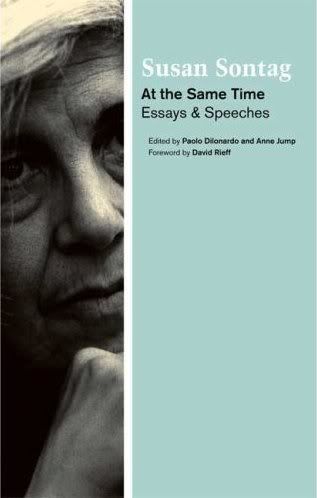She becomes her admirers, or, I heart Susan Sontag
From Susan Sontag's speech "Literature is Freedom," given as the Oscar Romero Award Keynote Address in Frankfurt, Germany on 10.12.03 & reproduced in her posthumously publish collection At the Same Time: Essays & Speeches:
"For writers are makers, not just tranmitters, of myths. Literature offers not only myths but countermyths, just as life offers counterexperiences--experiences that confound what you thought, or felt, or believed.
A writer, I think, is someone who pays attention to the world. That means trying to understand, take in, connect with, what wickedness human beings are capable of & not be corrupted--made cynical, superficial--by this understanding.
Literature can tell us what the world is like.
Literature can give standards & pass on deep knowledge, incarnated in language, in narrative.
Literature can train, & exercise, our ability to weep for those who are not us or ours.
Who would we be if we could not sympathize with those who are not us or ours? Who would we be if we could not forget ourselves, at least some of the time? Who would we be if we could not learn? Forgive? Become something other than we are?" (204-5)
"For writers are makers, not just tranmitters, of myths. Literature offers not only myths but countermyths, just as life offers counterexperiences--experiences that confound what you thought, or felt, or believed.
A writer, I think, is someone who pays attention to the world. That means trying to understand, take in, connect with, what wickedness human beings are capable of & not be corrupted--made cynical, superficial--by this understanding.
Literature can tell us what the world is like.
Literature can give standards & pass on deep knowledge, incarnated in language, in narrative.
Literature can train, & exercise, our ability to weep for those who are not us or ours.
Who would we be if we could not sympathize with those who are not us or ours? Who would we be if we could not forget ourselves, at least some of the time? Who would we be if we could not learn? Forgive? Become something other than we are?" (204-5)


1 comment:
The last paragraph is quite profound, and somewhat universal to a shared pursuit of something greater...a sense of purpose beyond "I".
Post a Comment